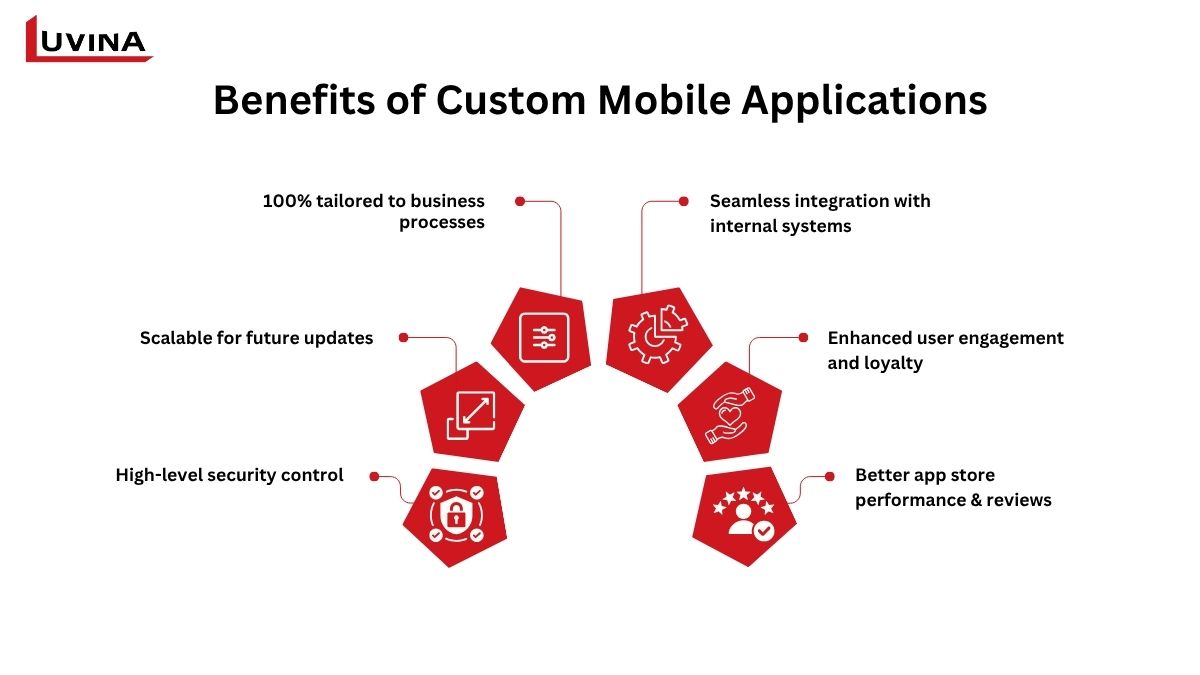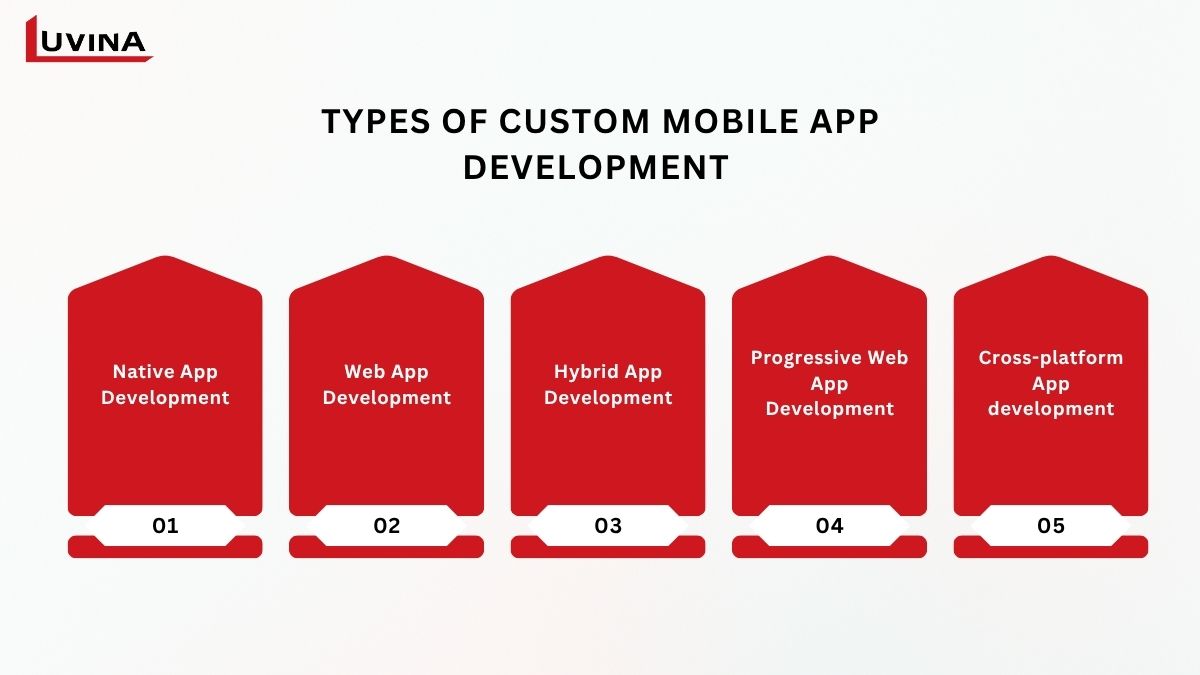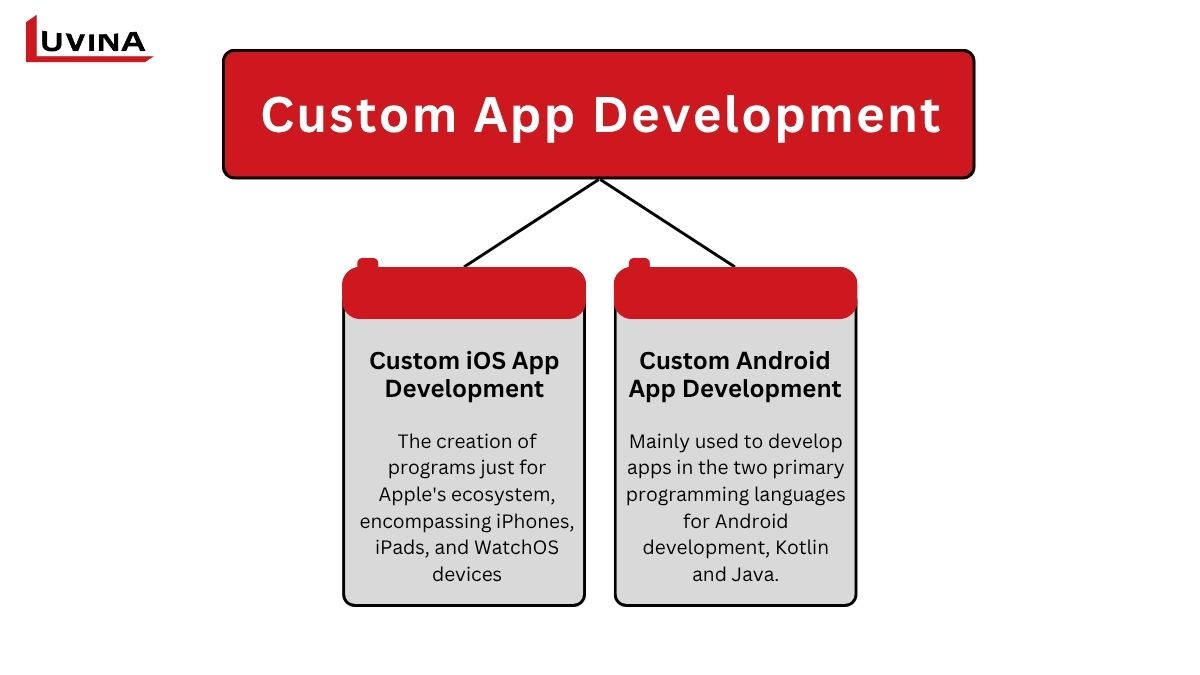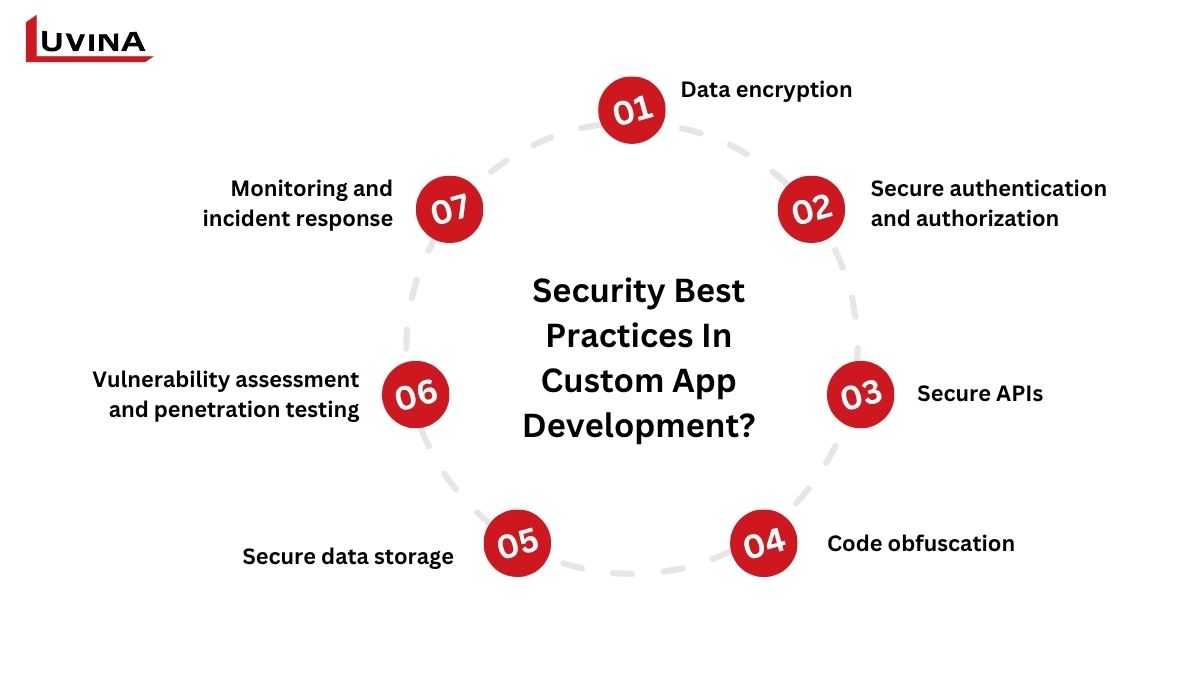According to Business of Apps, iOS has an average 30-day churn rate of 96.3% and Android of 97.9%, suggesting that typical, one-size-fits-all apps frequently fail to keep users or offer actual value. This is where custom mobile app development fits in.
How then do you create a mobile application that engages, keeps customers, and generates business outcomes? This article will help you discover key observations on developing customized iOS and Android solutions that distinguish your brand.
Key Benefits of Custom Mobile Applications
Custom mobile development offers a suite of advantages. Below are the key benefits of investing in custom mobile applications:

- 100% tailored to business processes: Unlike off-the-shelf solutions, custom mobile applications are created around your precise operational processes, guaranteeing perfect alignment with your internal processes, objectives, and customer journeys with no functional compromise.
- Scalable for future updates: As your business grows, your app should grow with it. Custom mobile development enables scalable architecture that can easily handle increased user loads, new features, and changing business demands without performance bottlenecks.
- High-level security control: Advanced, business-specific security methods are made possible by bespoke apps, hence lowering flaws and more successfully safeguarding sensitive information than typical options do.
- Seamless integration with internal systems: Developing custom mobile applications that connect straight to proprietary, ERP, or CRM systems ensures data integrity, boosts productivity, and provides a unified working environment.
- Enhanced user engagement and loyalty: A custom mobile app offers personalised user experiences, simple design, and functionalities like loyalty programs or push alerts, all of which greatly increase user satisfaction and enduring loyalty.
- Better app store performance & reviews: Enhanced app store visibility and higher review ratings generally result from a polished, well-integrated app, hence boosting your brand’s digital presence and legitimacy.
Types of Custom Mobile App Development
Depending on your goals, budget, and user expectations, different types of custom mobile app development can deliver unique advantages. Below, we explore 5 key categories of custom mobile applications.

Native App Development
Native app creation concentrates on creating mobile apps fitted just for one platform, either iOS or Android, employing specialized tools and languages like Swift or Objective-C for iOS and Kotlin or Java for Android. Deeper integration with the operating system is made possible by this technique, which also produces very fast, secure, and smooth user experiences. Native solutions are perfect for companies that place performance, scalability, and platform-specific capability first, whether you’re thinking about custom iOS app development or custom Android app development.
- Pros: Appropriate performance, thorough access to device capabilities, improved security, and a great user experience consistent with platform policies.
- Cons: Higher development costs and longer timelines due to the need for separate codebases for each platform.
Web App Development
Web app development focuses on building applications that run directly in a web browser, mimicking the experience of native apps without requiring users to download or install anything. These apps are built using standard web technologies like HTML, CSS, and JavaScript, and are designed to function across various devices through responsive layouts. As part of custom mobile app development, web apps offer an accessible and cost-efficient solution for businesses that prioritize reach and flexibility over deep device integration.
- Pros: Cost-effective, instantly accessible via browser, cross-platform compatible, and easy to maintain with centralized updates.
- Cons: Limited access to device features, reliant on stable internet connectivity, and lower user engagement due to absence from app stores.
Hybrid App Development
Hybrid applications are a workaround that exists between native apps and web apps. A hybrid app is built on a single codebase for several platforms. Hybrid applications are built on web technologies (HTML, CSS, JavaScript), and then the app is wrapped in a native shell which allows it to take advantage of device capabilities. Hybrid is a good choice for companies that want a good balance between the efficiency of development and the user experience.
- Pros: Faster time to market, shared codebase, offline assistance, and simplified maintenance save cost.
- Cons: Slight performance decline, less sophisticated user experience, and limited access to sophisticated native capabilities.
Progressive Web App Development
Developing progressive web apps (PWAs) aims at producing browser-based applications that provide a user experience near to native mobile apps. PWAs offer quick load times, offline capability, and smooth device-based performance by means of modern web technologies like HTML, CSS, and JavaScript. Since they don’t call for app store installation, users’ home screens can be added to them easily and cost-effectively for companies wishing to reach wide audiences.
- Pros: SEO benefits, cross-platform access, no app store needs, offline capabilities, quick and responsive, and quick.
- Cons: Reduced perceived value compared to native apps, unequal support across older browsers, and restricted access to advanced device functions.
Cross-platform App development
The purpose of cross-platform app development is to build mobile apps that are well-functioning on both iOS and Android devices through a single codebase. It provides some efficiency in app development, so functionality and features are ensured to have consistency in design and distribution across any device. This means a developer can write code once and publish on multiple platforms. For clients that want to expand their digital footprint without doubling their digital footprint or resources when developing, this is an easy, scalable, and cost-effective way to grow.
- Pros: Lower development costs, faster launch timelines, wider audience reach, and consistent UI/UX across devices.
- Cons: Slightly lower performance than native apps, limited access to some platform-specific features, and reliance on third-party frameworks.
Custom iOS vs. Custom Android App Development
When embarking on custom mobile app development, deciding between building for iOS, Android, or both is a fundamental choice that impacts your app’s success. Each platform requires different technical considerations, user expectations, and development approaches. The following sections explore various development types within the context of custom iOS and Android app development.

a. Custom iOS App Development
Custom iOS app development is the creation of programs just for Apple’s ecosystem, encompassing iPhones, iPads, and WatchOS devices. Apple’s programming languages, Swift or Objective-C, define the majority of these apps. Apps must follow strict design and functionality requirements established by Apple in order to guarantee flawless integration and smooth operation inside the ecosystem. Strong user experience consistency is the emphasis here.
Because of the platform’s devoted user base, renowned for greater involvement and ready to invest in premium applications, businesses frequently opt for custom iPhone app development. This accuracy and excellence demand, however, a higher development price and demanding App Store compliance standards. Custom iPhone application development presents a strong means to distribute advanced, user-centric programs tuned for Apple devices overall.
b. Custom Android App Development
Custom Android app development is mainly used to develop apps in the two primary programming languages for Android development, Kotlin and Java. Unlike iOS devices, which are developed on a standard hardware platform, Android device manufacturing is relatively unregulated. Consequently, there are hundreds of different Android devices available, manufactured by numerous manufacturers (including Samsung, Google Pixel, and many more).
Both the range of hardware and the use of the Android operating system afford Android developers greater flexibility in customizing products but also pose greater fragmentation across the wide array of Android devices. This results in longer development, testing, and optimization time frames for Android development compared with iOS and metallic development environments.
Thanks to its vast global user base, custom Android application development provides businesses with extensive market reach and opportunities to tailor apps for various device specifications and user preferences.
c. Hybrid vs. Native Custom Development
A custom mobile app development will require you to find the balance between hybrid and native, which is determined by the project objectives (and includes particulars like the company goals, budget, resource definition, and performance requirements). Cross-platform frameworks like React Native, Flutter & Ionic allow a developer to create applications via a single codebase that runs on iOS and/or Android smartphones, hence, hybrid app development. This approach becomes very appealing to companies wanting to hit several mediums quickly, since hybrid apps can reduce development time and create cost savings.
Hybrid apps can be successful under the right circumstances, however, there can also be limitations for performance and user experience, specifically for high-performance applications or heavy use of device hardware.
On the flip side, native app development generally creates applications in direct representation of the technology for either iOS or Android mobile devices, which can provide better performance, responsiveness, and direct access to platform-specific features. While native app development normally requires more budget and more time to build than hybrid apps, native apps can often be the best solution for applications where performance and user experience are a priority.
How Much Does Custom Mobile App Development Cost?
The cost of custom mobile applications begins at a low rate and increases based on many factors. Cost and comparison variables for all mobile app development include complexity, features, design specifications, platform, contractor scale, skill level, and location.
One of the main cost-determining factors is app complexity. Developing your app will become more expensive the more features and demanded functionality it has. For instance, a simple app might range from $10,000 to $60,000; a medium-complexity app costs in the $61,000 to $69,000 region. Feature-heavy or specialized apps can run up to $500,000. This is a broad spectrum, and the additional functions or projected deadlines can increase costs dramatically, depending on whether you’re trying to create something unusual or original.
When planning a budget, developer rates are also a key factor to consider. Development agency or freelance charges will differ by location. Generally speaking, this means that many of the mobile app development choices cited managing and/or minimizing costs through offshore development depending on the intended market are likely to charge less than similar developers in the U.S. Choosing to target both iOS and Android usually increases cost, but cross-platform frameworks can help cut costs by repurposing code for the two largest platforms.
Additionally, businesses should not overlook long-term operating and maintenance costs. Regular updates, security patches, server fees, and ongoing technical support are needed for maintaining your app’s stability, security, and compatibility with evolving platforms, thereby adding to the overall investment over time.
What are the security best practices in custom app development?
Developers involved in custom mobile app development have to include thorough security precautions throughout the lifecycle to safeguard consumers and their data. These are some of the best methods to guarantee a safe and reliable app:

- Data encryption: Strong algorithms such as AES256 and secure protocols like TLS should be used to encrypt sensitive data at rest and in flight. To stop illegal access, even if data is caught, passwords should be hashed safely.
- Secure authentication and authorization: Employ multifactor authentication (MFA), including biometrics and tokens, to confirm user identity; adhere to the least privilege principle by limiting user access to just essential data and features using role-based access control (RBAC).
- Secure APIs: Guarantee APIs have correct access controls to guard against unauthorized data access and protect APIs from well-known flaws, including injection attacks and faulty authentication.
- Code obfuscation: To make reverse engineering challenging, hence safeguarding proprietary logic and lowering the danger of exploitation, obfuscate the application code.
- Secure data storage: Utilise platform-specific secure storage choices like iOS Keychain and Android Keystore. Always encrypt locally kept data and refrain from saving sensitive information in plain text.
- Vulnerability assessment and penetration testing: Often, check the program for vulnerabilities using automated technologies and carry out manual penetration tests to find and address security flaws before they can be used.
- Monitoring and incident response: Real-time monitoring and alerting systems to swiftly detect suspicious behavior should be implemented along with a thoroughly revised incident response strategy to effectively contain breaches, minimize damage, alert stakeholders, and enhance future security systems.
Conclusion
Whether you’re looking to streamline operations, enhance customer engagement, or integrate emerging technologies, a well-executed custom app can be the cornerstone of your digital success. With the right development partner, your ideas can transform into scalable, secure, and future-ready mobile solutions.
Ready to make your vision a reality with custom mobile app development? Let’s build something exceptional together.
FAQ
How long does it take to build a custom mobile app?
It typically takes 2–3 months for simple apps and 6–12 months for more complex ones, depending on features, design, and integration needs.
Can I build a custom app for both Android and iPhone?
Yes, you can develop apps for both platforms using native or cross-platform technologies.
What technologies are used for custom mobile development?
Technologies like Swift (iOS), Kotlin (Android), Flutter, React Native, and backend frameworks such as Node.js, .NET, and Firebase are used for custom mobile development.









Read More From Us?
Sign up for our newsletter
Read More From Us?
Sign up for our newsletter